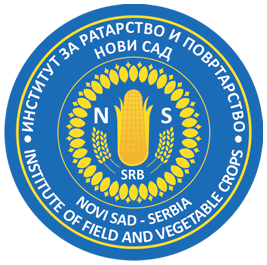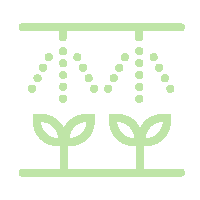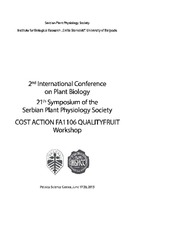Приказ основних података о документу
Effect of in vitro induced water deficit on lipid peroxidation intensity and antioxidant capacity of sugar beet
| dc.contributor | Uzelac, Branka | |
| dc.contributor | Šiler, Branislav | |
| dc.creator | Nagl, Nevena | |
| dc.creator | Kiprovski, Biljana | |
| dc.creator | Taski-Ajdukovic, Ksenija | |
| dc.creator | Ćurčić, Živko | |
| dc.creator | Malenčić, Djordje | |
| dc.date.accessioned | 2021-10-28T11:07:59Z | |
| dc.date.available | 2021-10-28T11:07:59Z | |
| dc.date.issued | 2015 | |
| dc.identifier.isbn | 978-86-912591-3-6 (SPPS) | |
| dc.identifier.uri | http://fiver.ifvcns.rs/handle/123456789/2324 | |
| dc.description.abstract | Accompanied by oxidative stress as a signal to activate defense mechanisms, various abiotic factors induce peroxidation of membrane lipids. The aim of this research was to analyse changes in lipid peroxidation (LP) intensity and antioxidant capacity of selected sugar beet genotypes during micropropagation under the conditions of water deficit. Performed research represents a part of a more comprehensive study, the purpose of which is understanding the difference in acclimation to drought as the major abiotic factor limiting sugar beet production in Serbia. The best solution for overcoming this obstacle in successful sugar beet growing is breeding for drought tolerance. Tested sugar beet genotypes were grown and multiplied in vitro on standard nutrient medium. Axillary shoots were placed on the micropropagation media with 3% and 5% PEG for 28 days, which caused physiological drought stress. All genotypes could be divided into three groups according to the level of LP, however only two of eight genotypes had significantly higher LP intensity during drought conditions when compared to their controls (10.1-29.1%), as well as significantly reduced antioxidant activity (22.2-59.9%). A slight decrease in LP intensity and enhanced antioxidant capacity (up to 92.9%) in comparison to control were recorded in treatments of the rest of investigated genotypes. As for correlation between tested biochemical parameters and growth conditions, all genotypes differed in their response to PEG concentration. Obtained results showed that LP intensity and antioxidant capacity could be used as biochemical parameters in assessing drought tolerance of individual genotypes in further selection of sugar beet. | sr |
| dc.language.iso | en | sr |
| dc.publisher | Belgrade : Serbian Plant Physiology Society | sr |
| dc.publisher | Belgrade : University of Belgrade, Institute for Biological Research „Siniša Stanković“ | sr |
| dc.rights | openAccess | sr |
| dc.rights.uri | https://creativecommons.org/licenses/by/4.0/ | |
| dc.source | Book of Abstracts, 2nd International Conference on Plant Biology, 21st Symposium of the Serbian Plant Physiology Society, 17-20.06.2015., Petnica Science Center, Serbia | sr |
| dc.subject | antioxidant activity | sr |
| dc.subject | biochemical markers | sr |
| dc.subject | micropropagation | sr |
| dc.subject | sugar beet | sr |
| dc.subject | drought stress | sr |
| dc.subject | abiotic stress | sr |
| dc.title | Effect of in vitro induced water deficit on lipid peroxidation intensity and antioxidant capacity of sugar beet | sr |
| dc.type | conferenceObject | sr |
| dc.rights.license | BY | sr |
| dc.citation.epage | 153 | |
| dc.citation.spage | 153 | |
| dc.identifier.fulltext | http://fiver.ifvcns.rs/bitstream/id/6291/bitstream_6291.pdf | |
| dc.identifier.rcub | https://hdl.handle.net/21.15107/rcub_fiver_2324 | |
| dc.type.version | publishedVersion | sr |


